Lauren Tabbinor
Students & Alumni. Criminology.
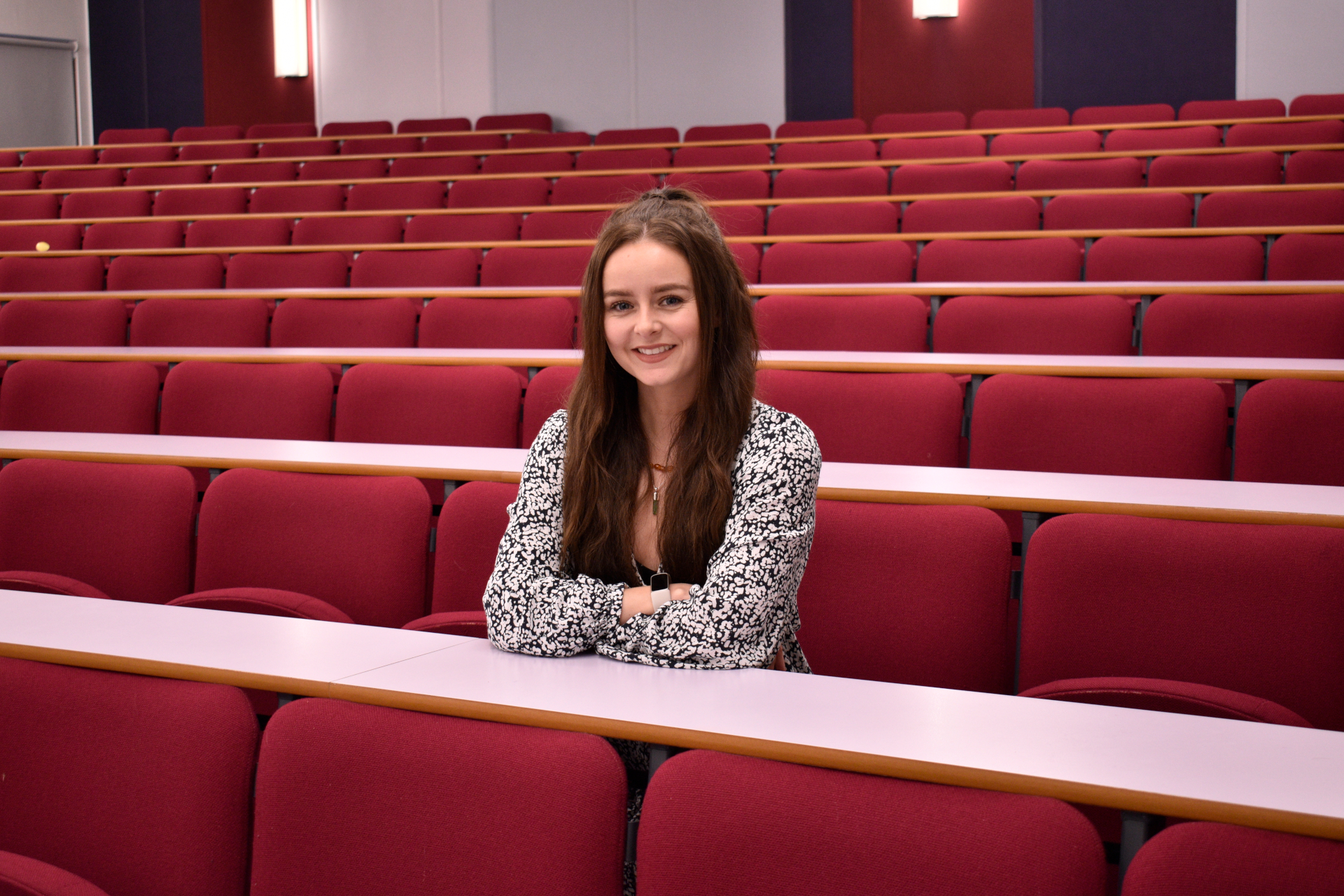
Lauren graduated from our BA (Hons) Criminology in 2014, and has since worked mostly in the education sector, including a role with the Prince’s Trust. She is currently Student Ambassador Co-ordinator at ARU.
What have you been doing since graduating from ARU?
Aside from a couple of roles within the retail sector, when I’d just freshly graduated, I predominantly worked within the education sector. So, before I joined ARU, I worked for an FE College in Stoke-on-Trent, with the Prince’s Trust. It was kind of part charity part FE, delivering education programs to young people between the age of 16 and 25.
The whole point of the program itself was to enhance students getting opportunities in the education sector, or maybe employment, or even training. It was working with young people that had maybe come out of care authorities, or potentially released from prison, or suffering from mental health illnesses etc. It was quite a testing role at times, but very rewarding, and I really, really loved that job.
Then I had a little bit of a turnaround, and wanted to move out of Stoke and permanently base myself in Cambridge. It had been quite a pull on the heartstrings for a long time, that I wanted to return to where I'd studied anyway and where my social circle was. I really loved it as a student so started to look at roles within education again and joined ARU in August 2019 as a Schools and Colleges Engagement Officer.
Is there one thing that inspired your interest in Criminology?
I spent a lot of time as a young person reading lots and lots of non-fiction, reading lots on, obviously, different serial killers - the standard thing people say when they think of criminology.
But actually when I came to look at the university in 2010, I sat in on a lecture with someone who's still with the university, Colleen Moore. I listened to her talking about the depths of Criminology, and what you’re looking at in terms of who the victim is, who the perpetrator is, how the media get involved with deciding where the public think we need to point fingers, and what’s happening across the world - things maybe we don't necessarily know about that we should know about. And that really inspired me to be honest, because she was so enthusiastic about her subject.
She went on to talk about her areas of interest and study, which were related to sexual violence, women and women's rights etc, and I think that was something that sparked that confirmation in me, that actually this was probably the right degree for me.
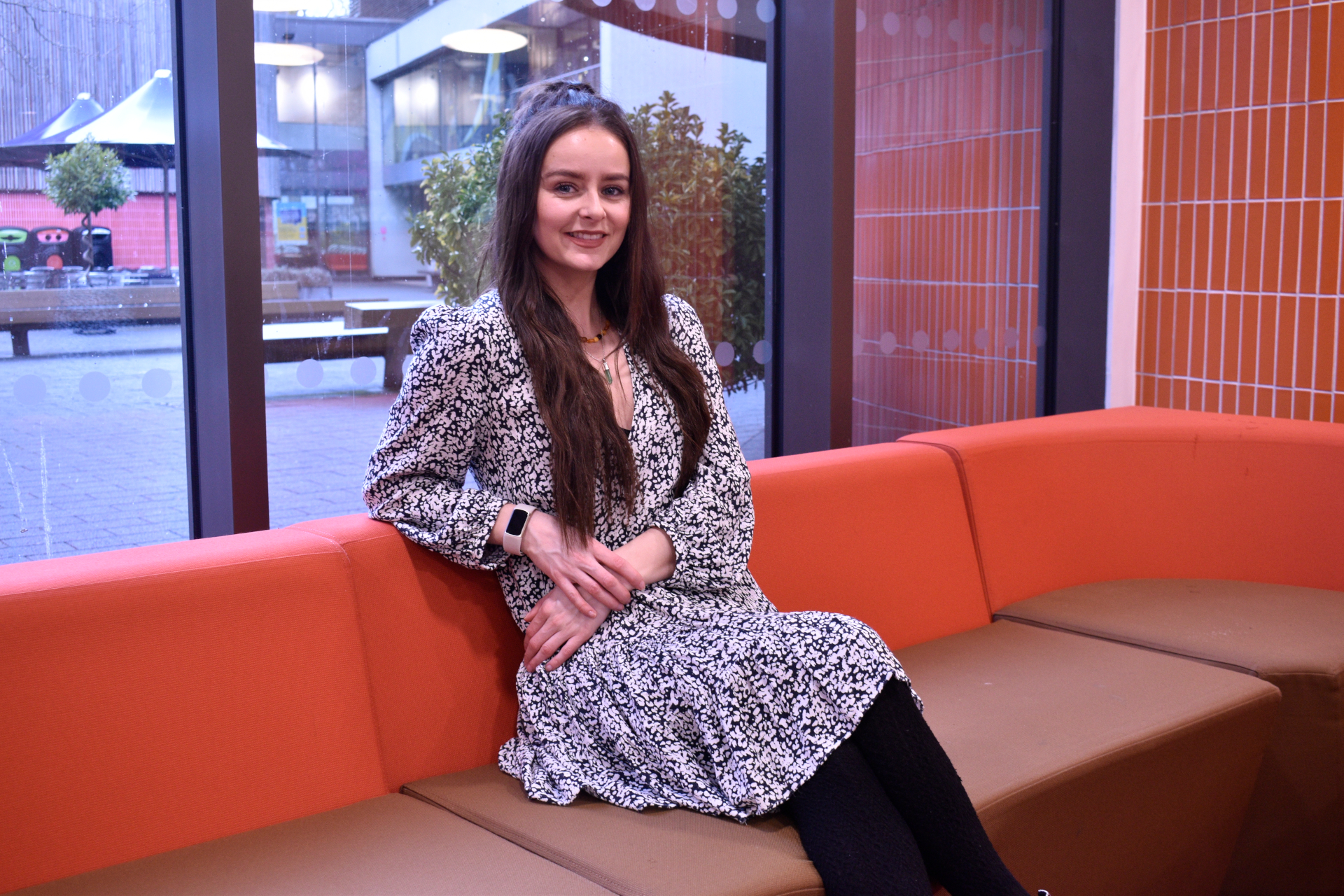
What’s the most valuable thing you took away from your education?
I think it's a tricky one. I think the first thing that comes to my mind is the people that I met, and the second thing is knowledge. The people that I met on the course were the most amazing group of individuals I've ever met, and there's a lot that I am still very good friends with even 11 years later – they’re a big part of my life. If I hadn't moved to Cambridge and studied criminology at ARU, I would never have had the opportunity to gain those friends and that knowledge.
There were just so many topics, discussions and debates, and on different world events that I just had no idea about at all. My dissertation topic actually came from one single module that I took in my second year of degree, which was Cultures of War and Peace. We analysed the Rwandan genocide in 1994, and then I went on to write 10,000 words analysing and evaluating sexual violence against women in war zones. So, yes - I think knowledge and people.
Which aspects of the course most helped your career development, and why?
I think I was always a person that demonstrated empathy anyway, but the kinds of things I learned during my degree enhanced that even more. It’s hard for me to put it into words really, but I think I had so much more understanding about things that were happening outside of my life. I had a relatively lovely upbringing, nice parents, good siblings. I had things I needed to have, access to education and all those things. I think it became quite clear to me during the degree that I’m quite privileged in that way, and I think it developed my empathy and understanding for other people even more.
Going into the Prince’s Trust, that became even bigger once I started that role, because of the types of people I was working with, and the kinds of lifestyles and backgrounds that they came from, and the things that they were experiencing on a daily basis. It was a coaching role as well, so you had quite honest conversations with some of them when they felt they could trust you a little bit more. I think that became an even stronger character trait, that has stayed with me. Just that little bit of understanding that nobody really knows what is going on in someone’s else’s life, so you’ve got to always be kind to people, because what they go home to might not be what you go home to.
What piece of advice would you give to your younger self?
I would just get involved more and not question the opportunities. Just take them as they come. I think that I was quite an anxious character when I came to university. Although I had a really wonderful time at ARU as a student and graduated with first class Honours, worked really, really hard during my degree and met some amazing people, I do reflect back sometimes and think there are more things that I could have done during my university experience that I didn't, and that was probably because I was too nervous to do so. So I would probably tell the younger me not to worry about everything and just embrace the process. You don't need to question everything and risk assess everything. I think that's a trait that I've got anyway, but I think had I have relaxed a little bit more, I probably could have done a little bit more as well.
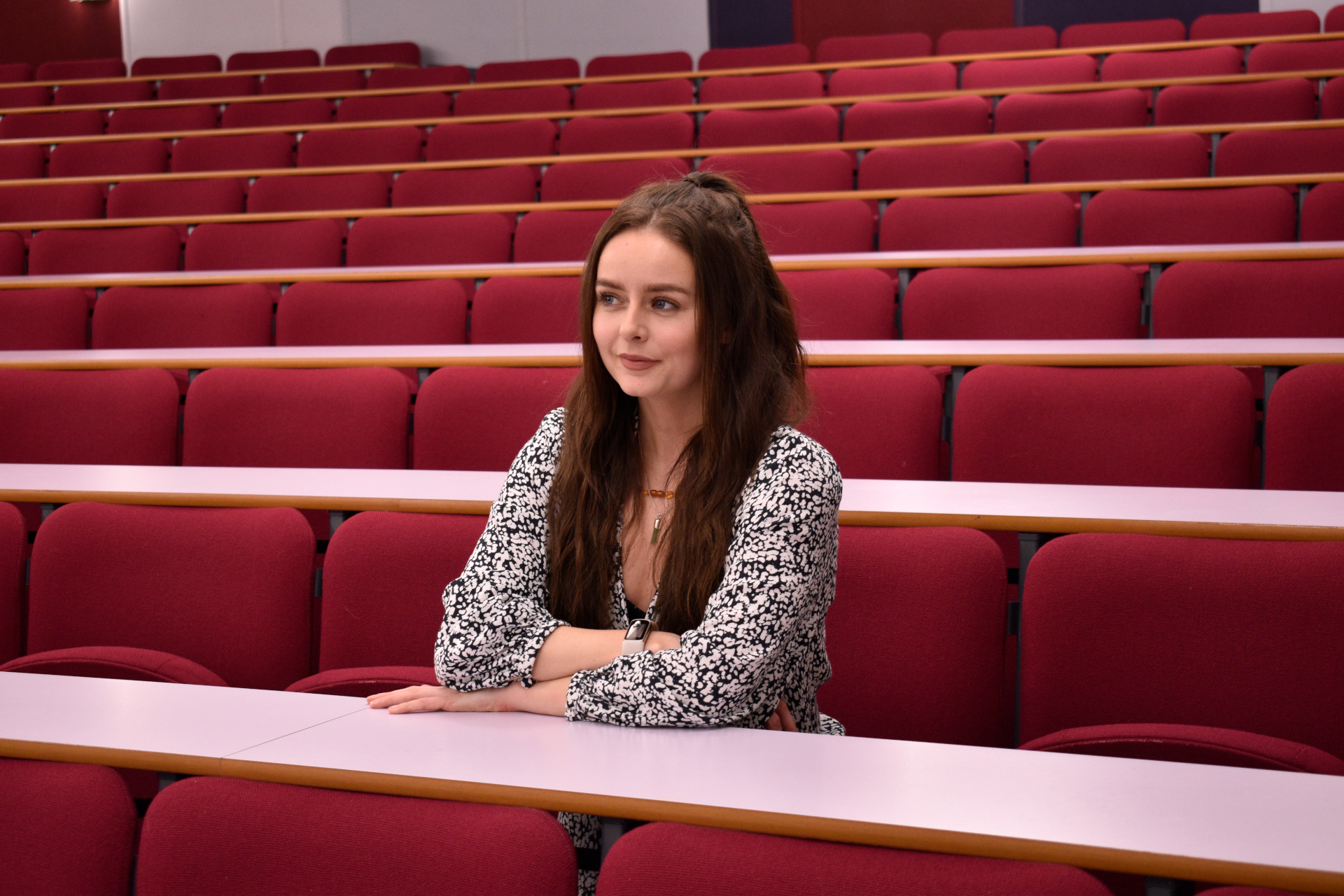
What was the support like that you received from the Criminology course staff?
I cannot thank my course lecturers more highly. I have so much respect for that staff team in general. I still see them now, obviously, and I still keep in touch with them, but they were such an inspiration. They've all got different backgrounds in terms of their areas of discipline, which made the course even better. They were very, supportive. If you ever needed any support with written work or just questions about referencing, they were approachable and friendly. It was very much a community feel. Our course was really close knit, and that obviously made the experience even better.
What was your favourite thing about studying in Cambridge?
I came to an ARU open day in October 2010, so I was a very prepared student. I kind of knew what I wanted to do, so I did everything early, but as soon as I walked through the doors and picked up my little bag of goodies that they give you on an Open Day, I got to my course talk with Colleen and it was at that point that I just knew it was the right place for me. I just felt instantly like, “OK, yeah, I can move here. I'm quite confident to do that.”
And after the Open Day we had a little wander around the city, me and my Mum and Dad. I think them feeling at ease made me feel at ease as well, because they straight away were kind of like, “Yeah, I think this is a really lovely place to be.” We had a whole walk around. We went to the Grafton Street side and then over towards where King’s College is, and fully explored the city that day. I just instantly felt at home and comfortable.
Obviously, as a first year student there was lots of work with the Student Union, who were very proactive with the student body. They were doing what they called ‘town takeovers. You could go and explore the city a little bit further, and the nightlife too. When I found my social circle, we spent quite a lot of time out on the commons, especially during the summer months. A lot of time just relaxing outside and, to be honest, that's still something I do now. And I really, really enjoy that time because I think it's very peaceful. You're out in nature, especially if you sit down by the river. It's so relaxing.
What projects are you currently working on, both at work and outside it?
More than anything, my biggest project really is upskilling our students and filling them with confidence, so that when they graduate they can go on to do whatever they want to do – whether that’s related directly to the course that they’re studying or something else. If I’ve played a part in developing those skills, and giving them the confidence to go out and ace their interviews, then my job’s been done well, I think.
I'm still with the Schools and Colleges Engagement Team, but recently moved to the Student Ambassador Coordinator role. So I'm quite new to the post really, but my main focus is training our current Student Ambassadors to work with the Schools and Colleges Team. So that is a variety of things really. It could be something as simple as delivering a campus tour to a prospective student, or supporting a Taster Day, where they might talk about their student life or even present a little bit about what it has been like at ARU. It's about training those students to do that so, when pupils come on to campus from schools and colleges, we have lots of relatable characters that they can look up to as role models.
Naturally, as staff, when we say we went to university and we did this and that, that's great. But actually we know from feedback by our schools and colleges that students like to hear from current students. So it's really about upskilling our student body to do those kinds of roles, which again is a two-way street. It's a paid role naturally, but it's about the skills that our students get from working on these kinds of events. They get to learn a little bit more about Higher Education. They learn a little bit more about outreach and what outreach means within Higher Education, especially at ARU, and what types of students we support and how we support them.
Where now
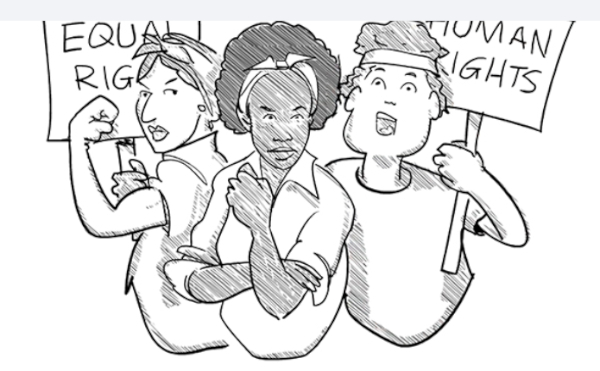
ARU website
BA (Hons) Criminology
Explore the nature of crime, justice and punishment and prepare for a career in criminal justice and crime prevention by studying for our Criminology degree in Cambridge.
Find out more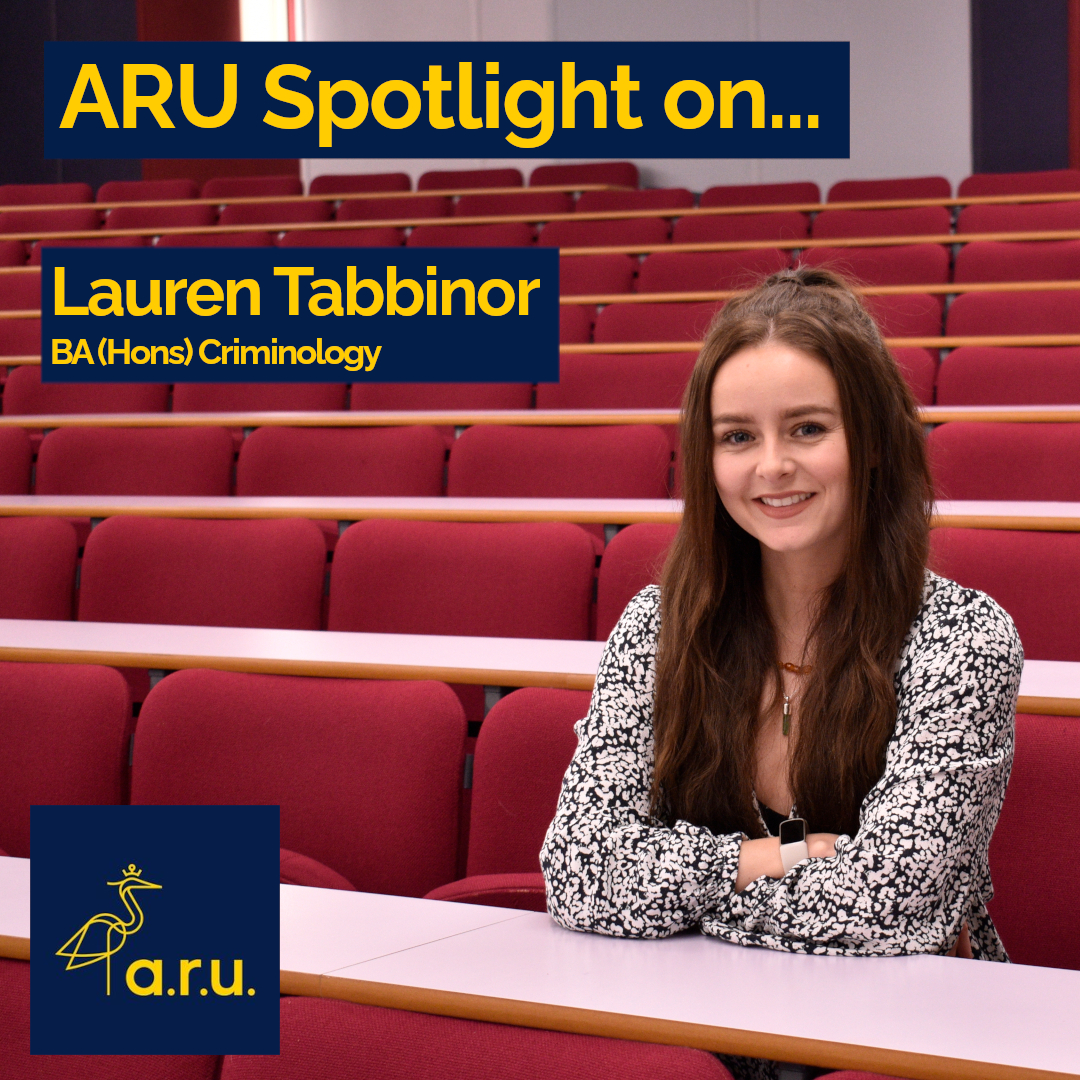
ARU Spotlight Podcast
Lauren Tabbinor, BA (Hons) Criminology
Listen to the full interview with Lauren on Spotify.
Listen now